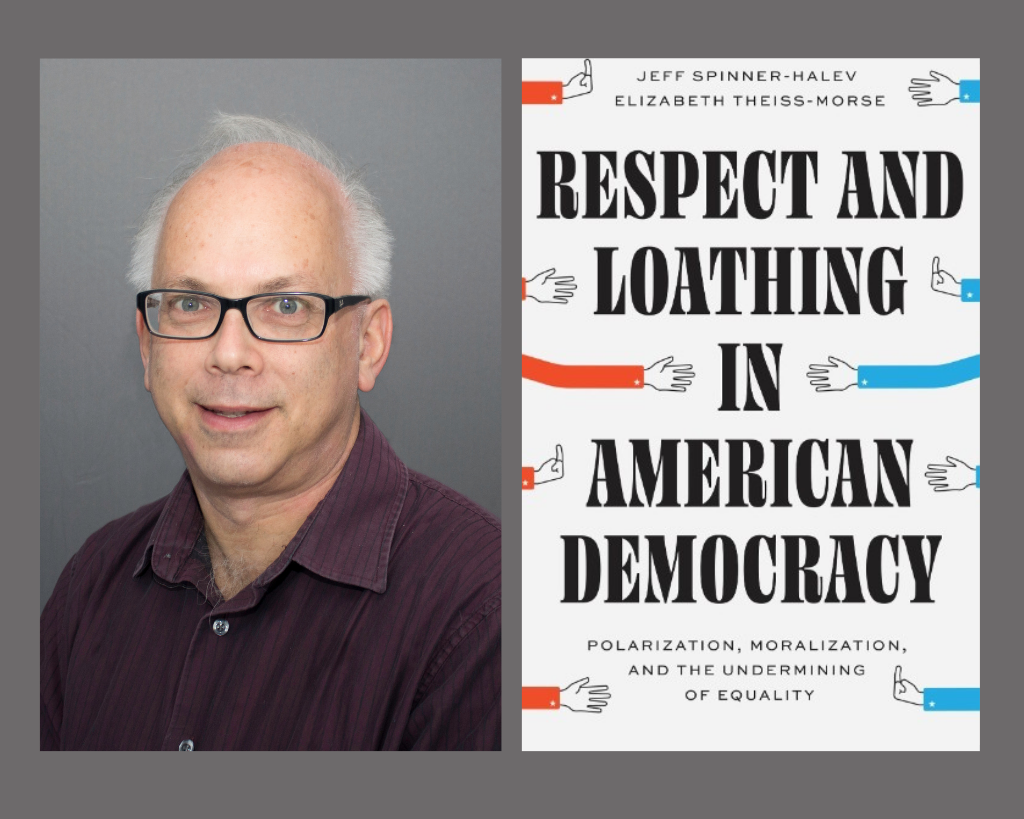Bookmark This is a feature that highlights new books by College of Arts and Sciences faculty and alumni, published each month. The April featured book is Respect and Loathing in American Democracy: Polarization, Moralization and the Undermining of Equality (The University of Chicago Press) by Jeff Spinner-Halev and Elizabeth Theiss-Morse.
 Q: Can you give us a brief synopsis of your book?
Q: Can you give us a brief synopsis of your book?
A: Respect is in trouble. Many Americans think that respecting other citizens is a virtue of a democratic society, yet many struggle to respect opposing partisans. There is a significant gap between what citizens say about respect in the abstract and what they think about respect toward opposing partisans. Our research has found that those who hold liberal views hold respect as central to their robust view of democratic equality, but they struggle the most with granting respect to their opponents. Political scientists note that liberals and conservatives actually agree on more issues than they realize. While our evidence supports this claim, we also find that opposing partisans often moralize different issues, and they weave these moralized issues into a worldview. This worldview frames even mild detractors as opponents of one’s morality, which makes respect hard to grant. Toward the end of the book, we argue for the need for people to be pluralistic and to be more cognizant of the tensions in their own political and moral lives. If we are more aware of how we balance different values in our own lives, perhaps we will better accept the plurality of values that is inevitable in any society.
 Q: How does this fit in with your research interests and passions?
Q: How does this fit in with your research interests and passions?
A: I am a political theorist who has always been interested in the gap between theory and practice, and I became intrigued with the idea that we are all taught to respect one another but many people struggle doing so. I have always been a political theorist with an eye toward actual political institutions, but my collaboration with my friend Elizabeth Theiss-Morse, who is a political psychologist, deepens the interface between the empirical and the normative. There are few books in political theory where the authors conduct focus groups and surveys like we do; there are few books by empirical political scientists that are as explicitly normative as this one. Our co-authorship allowed us both to push our research interests in an unusual and productive direction.
Q: What was the original idea that made you think: “There’s a book here?”
A: I was having lunch with a friend after the 2016 election and we were discussing the results. He just suddenly said, “I am sorry, maybe this is wrong, but I cannot respect anyone who voted for Donald Trump.” And I thought to proclaim an inability to respect about 45% of the population is alarming, but also interesting from a scholarly point of view. This was a respectful man who was struggling with the idea of respecting so many of his fellow citizens, and it seemed likely that there were many others like him.
Q: What surprised you when researching/writing this book?
A: We found through our research that liberals are modestly less respectful than conservatives. This is driven in part by young college-educated conservatives who often have more liberal friends than the reverse. A couple of our conservative focus group participants used the language of when they “came out” to their friends. I also had no idea how much I would love conducting focus groups, they were so much fun to do. Finally, I did not realize how hard it would be to get conservatives to agree to be part of a focus group, even though we promised confidentially.
Q: Where’s your go-to writing spot, and how do you deal with writer’s block?
A: I often write in my office, or in coffee shops, like I am right now. I have the opposite problem of writer’s block — what one might call “writer’s drivel.” I often sit down and just start writing. After a few days, I might have 12 to 15 pages, and then I am quite embarrassed when I read it since most of it is drivel. I have large Word files on my computer of things that I cut from my draft chapters and draft articles. Usually, there are one or two paragraphs worth saving in my first go around. I find the bits worth saving, and go from there, and hope that I got most of the drivel out of me, but sometimes more finds its way to the page.
Spinner-Halev is Kenan Eminent Professor of Political Ethics in UNC’s department of political science. Theiss-Morse is Willa Cather Professor of Political Science at the University of Nebraska-Lincoln.
Stephen Macedo of Princeton University writes: “Respect and Loathing in American Democracy breaks much new ground. It brings normative insight to bear on fresh data to illuminate a problem at the core of democracy in our time: why people have such a hard time respecting those on the other side of our polarized partisan divide.”
Nominate a book we should feature by emailing college-news@unc.edu. Looking for more faculty and alumni books to add to your reading list? Check out our spring ’24 College magazine books list.
